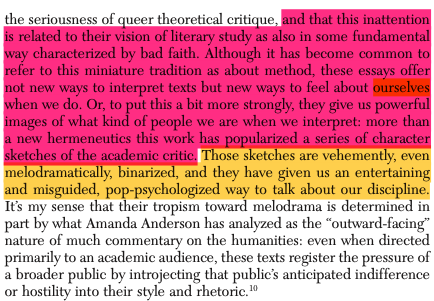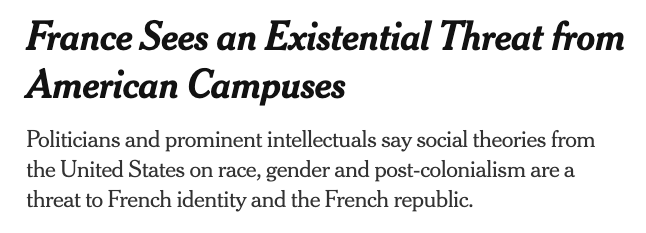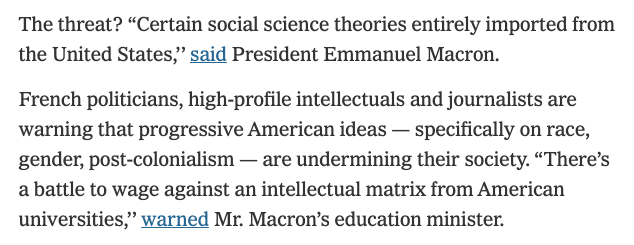
1) Dreaded thread on why I think the response to postcritique is so vitriolic. Short version: Because literary studies is a discipline in search of an application.
2) Before I go on, I'll say from the outset that many in lit studies explicitly reject the idea that the field *should* have an application. My opinion is that's fine if you want to do book clubs, but if you want an institution you can't ignore that difficult issue. But anyway...
3) The evidence by this point is overwhelming that when lit scholars talk about 'method' we're actually just talking about ourselves: 'ways of reading,' 'how we argue,' 'phenomenology of reading,' etc. etc.
5) But none of this is method discussion. Talking about ourselves, how we approach our objects of study, our motives and objectives, our commitments, etc. would be the *beginning* of a method convo in every other discipline. In lit studies it's the *end*, or the whole convo!
6) I think that's bc as a field we actually don't know what our purpose is, so we turn with alacrity to critically analyzing the conditions of our professional lives, labor situations, etc., using tools never meant for such analysis to 'read' ourselves instead of our objects. ...
7) In that way critique gets notionally bound up in our social and labor conditions in ways it's actually not. We overestimate the representational value and impact of our critical gestures bc our tools (traditionally) only work in this territory. It's a mismatch to be sure.
8) Likewise we overestimate the role of narratives in producing or enabling our present social, labor, institutional conditions. We tell ourselves that the reason 'the humanities' are on the ropes is that conservative culture warriors and politicians wage neoliberal war on us...
9) There's truth to that, but that our preference for this tidy narrative leads us to overlook is that the world in 2021 will use any pretext to explain and enact the inevitable, which is that it no longer needs arbiters of of a 19th-20th c version of literature and culture.
10) In other words, this narrative conservative & neoliberal attack on us is superficially correct, but it's just the veneer. The fact is even ordinary progressives who love and appreciate art don't need a dated version of literary study. Everything else is downstream from that.
11) Progressive activists don't need interpretations of novels and poems *as we presently do them* anymore than Young Republicans.
12) What I'm getting at is: lit study as a field has been implicitly or explicitly aware of all this for some time. These realities invite the defensive tone of our public humanities work. Critique has been the keyword for the field's dominant sense of its application.
14) I'm suggesting it's no longer possible to tell ourselves that story--that our application is political activism--with a straight face. Especially because it in no way distinguishes our work from work in other disciplines with far more public and policy credibility.
15) This is why the critique / postcritique debate is so vitriolic. It's like a fight at a funeral. It's processing all kinds of grief. It's blaming one another as critical proxies for some larger political forces that never cared one way or another how we interpret texts.
16) Now a surprise: I'm actually a lot more optimistic about the future of the field than my remarks to this point might suggest.
17) We're here for the end of something, which means we're also in the position to make something new, something suitable for our time and the particular challenges it brings.
18) For my part, I don't think that 'new' thing is turning back the clock and recovering the energy of late 20th c. energy literary and humanistic education. I don't think that's coming back. But I do think much of the world is grappling with ...
19) significant changes in the organization of knowledge and knowledge work, the structures of our institutions, etc. And at the heart of those reorganization are some things we in lit studies can be very good at:
20) Historical genre: What are the new, mixed, influential informational genres now and where do they come from?
21) Conceptual engineering: Can we fix language (to use Hermen Cappelen's phrase) to make concepts work better for us in the world?
22) Natural Language Processing: In light of above, what will be our role in e.g. producing non-racist algorithms, or making AI work well with humans and human languages.
23) This isn't an exhaustive list by any means, but it's a few things that excite me about what lit scholars can do. What this work might mean is neither critique or post-critique as such, but post-interpretation as the central organizing mode of lit scholarship. /end
Addendum: Another thing I should've mentioned: Speculative fiction and fiction-as-modeling is another really exciting area where lit scholars offer our field and the wider world something generative and necessary.
• • •
Missing some Tweet in this thread? You can try to
force a refresh








